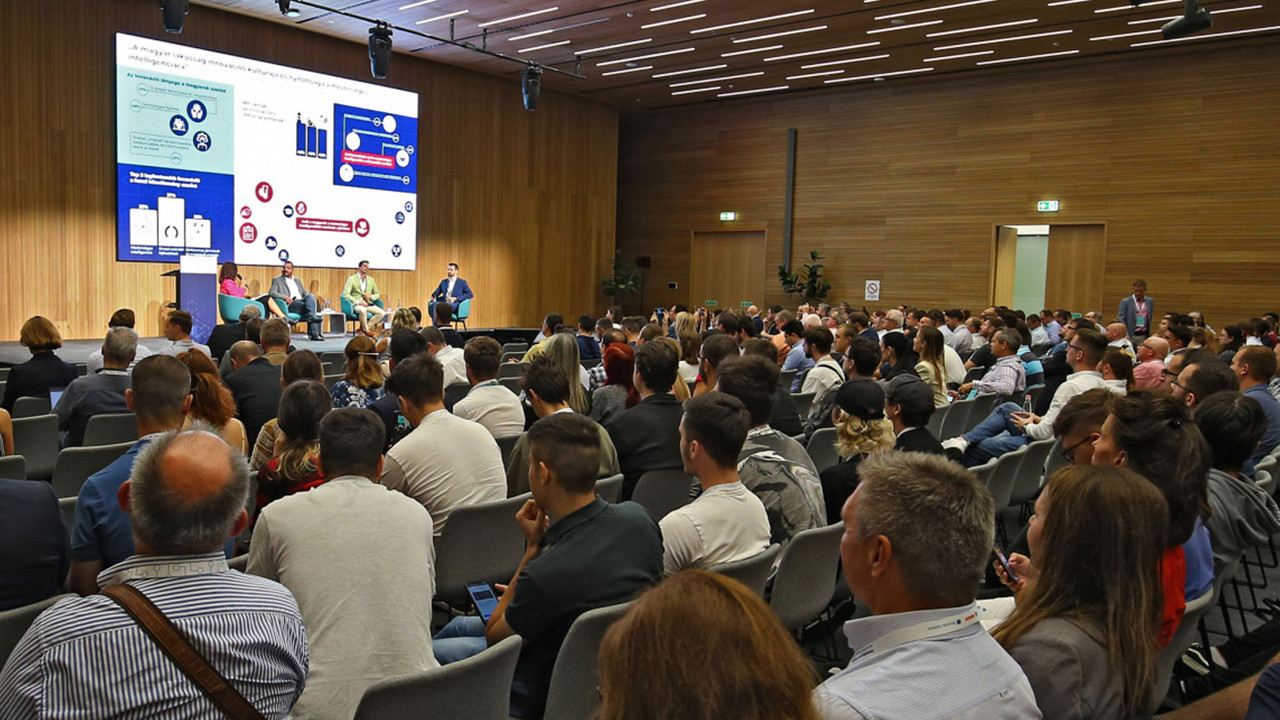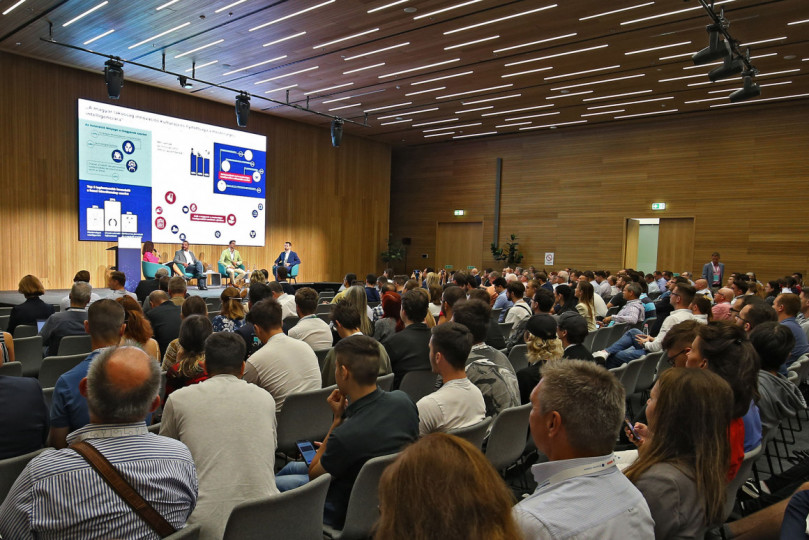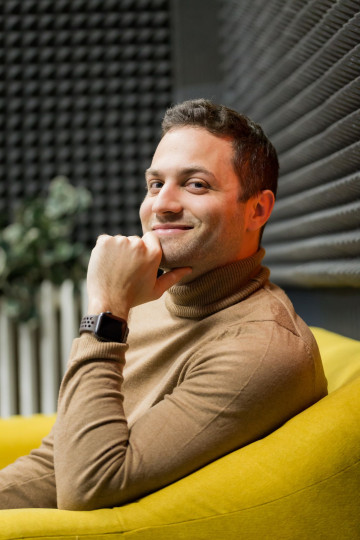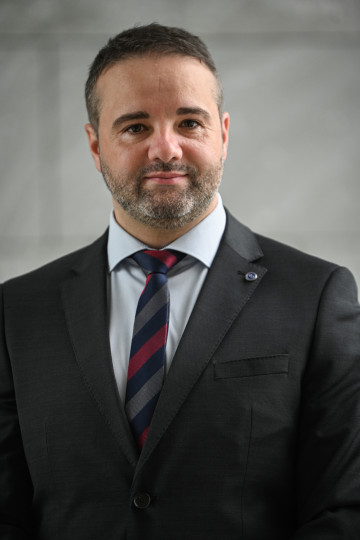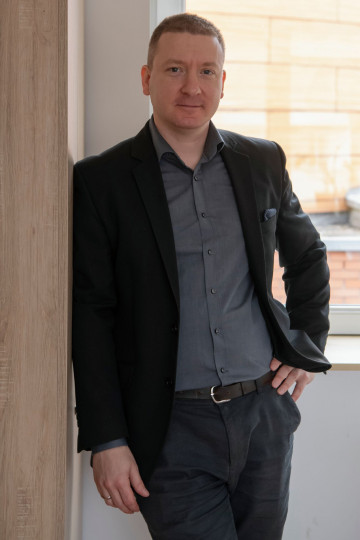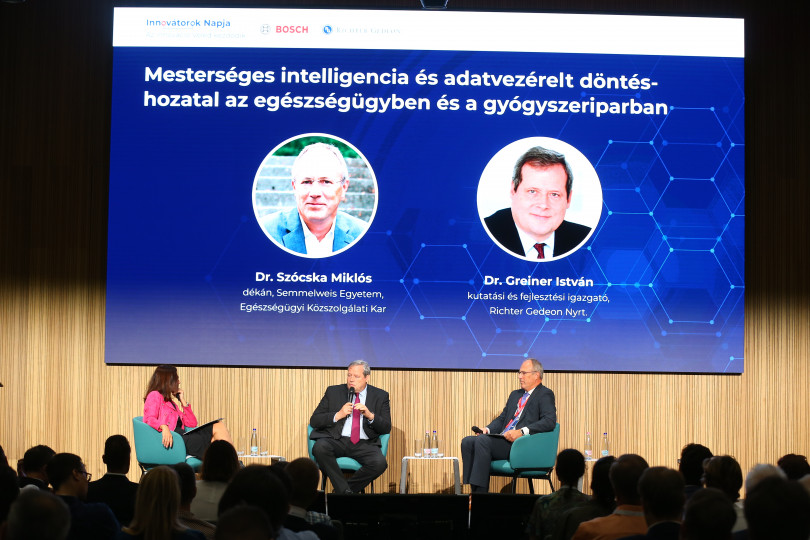Budapest – Artificial intelligence is being integrated into the economy, industry and changing our lives at a dizzying pace. We are witnessing a new industrial revolution. AI is not replacing human knowledge but complementing it: making decisions and business processes more efficient, faster and better. The question today is not only what AI will be able to do, but also how it will impact our everyday lives, this was one of the main takeaways of the Bosch×Richter Innovators' Day conference.
Artificial intelligence will take it all
In 2023, the world's top 3 online giants will spend a total of $120 billion on AI-related developments, a clear indication of the importance of the field. Hungary also has an Artificial Intelligence Strategy, which aims to achieve a 15% GDP growth by 2030 through the adaptation of AI, a 26% increase in the value added per capita of Hungarian SMEs and 1 million people working in jobs where they use AI to perform their tasks, said Roland Jakab, president of the Artificial Intelligence Coalition.
Major players in the automotive industry have also committed to AI technology. At the global Bosch Group, it is already becoming a reality this year that all its products and solutions will either incorporate AI-based technology or will be developed and manufactured using AI. The Bosch Budapest Innovation Campus, which was opened last year and is the second largest R&D center of the international company after Germany, is actively involved in this.
Like in the movies - from machine vision to fully self-driving cars
Artificial intelligence capabilities in the fields of machine vision and image processing are already being used by the automotive industry. The recognition of objects in the environment is constantly improving, enabling ever higher levels of self-driving. For example, Bosch's AI technology enables the vehicle to park for you in the car park at Stuttgart airport, when you get out of your car. And then you can summon the car to you via an app on your smart watch, just like in the movies. The use of artificial intelligence is not only in passenger cars, but also in industrial vehicles. One example of this is the AI-based off-highway radar system developed by Bosch, which recognizes elements of the environment and can be used to significantly improve the safety and productivity of construction and agricultural machinery, said Gyula Halmos, Senior Expert of Cloud and Automation at Bosch.
Artificial intelligence in factories
For innovative companies, the introduction of AI will in future become a “must have”, almost a mandatory step, not only in development but also in production. Currently, one of the main tasks in manufacturing is to create the prerequisites for the use of AI. In the case of existing technologies that have been in operation for a long time, it is worth analyzing the benefits and the areas where the improvements required for AI (e.g. retrofitting sensors, digitalization) are worthwhile. For new manufacturing capacities, this is not an issue for today's technologies, because the level of digitalization required for the introduction of AI is already given, says Attila Szénási, Director of Pharmaceutical manufacturing at Gedeon Richter Plc.
Cheaper and more reliable products with AI
AI can also make complex industrial processes such as car manufacturing more efficient and cost-effective. For example, after proper training artificial intelligence linked to cameras can detect defective parts “at a glance” in the early stages of production. This way the defective parts, for example chips, are not installed in more complex components and ultimately in vehicles. This reduces the likelihood of faults in cars and makes them more reliable. The economic loss will also be much lower if a faulty component is scrapped early in the value chain than if it is already built into a complex and expensive piece of equipment or vehicle and causes a serious failure later, said Mátyás Pótsa, Director of Innovation Ecosystem at Bosch Group in Hungary.
From ChatGPT to BoschGPT: language models at the service of industry
It’s foolish to think that AI is only useful for image processing and analysis in industry. In addition to the well-known and easily accessible ChatGPT, which works with information from the web, the development of “BoschGPT” is already underway. With this, the company is paving the way for the industrial use of AI-based language models in closed, professional systems working with sensitive business information. It's easy to see how much faster and more efficient it makes the operation or repair of a complex manufacturing system if, instead of browsing through thousands of pages of manuals, you can get an immediate answer to a few verbal technical questions using AI, said the Bosch expert.
Smarter and smarter robots
In addition to analytical and decision-making AI, generative, creative AI is gaining ground in industry and as part of this, the development of robotics is expected to accelerate. As more and more industrial data is learned, robots will be able to perform more and more tasks intelligently and with increasing sophistication. Machines will get smarter and more agile, with AI they will take over many operations and do them better, and humans will be able to do more creative, higher value-added tasks, says Prof. Dr. Péter Galambos, professor of robotics at Óbuda University.
Precision therapies tailored to the individual
Healthcare is one of the areas where people expect the most from the development of artificial intelligence, according to a joint Bosch and Richter survey. According to experts at the Innovators' Day conference, AI could indeed bring major advances in the diagnosis and treatment of diseases, and AI is almost certain to become an indispensable part of the medical toolkit. With AI, the choice of drugs for patients and the adjustment of doses will be much more personalized than today. This AI-based precision medicine can make therapies more effective and reduce the incidence of side effects in the future, said Dr. Bence Kovács, Head of General Medicines Business Unit of Gedeon Richter Plc.
Development of new medicines could accelerate
The development of new medicines is a notoriously long process, but the length of this process is not unimportant. With the help of artificial intelligence, the lead time can be shortened. In the first, preclinical phase of drug discovery, AI can make development faster and more economical by designing and selecting the right molecules. The duration of the subsequent clinical trials, on the other hand, is already prescribed by law, where there is less room for maneuver, but the overall involvement of AI can definitely make the time to market for new drugs faster and more cost-effective, summarized Dr. István Greiner, Research and Development Director at Gedeon Richter Plc.
Humans are and will remain irreplaceable
Since the introduction of EESZT (the Hungarian digital health infrastructure), Hungary has been one of the most data-rich countries in the world in terms of health data. From this continuously expanding, systematized data mass, a lot of useful conclusions and results can be obtained with artificial intelligence, which can serve the purposes of prevention and cure or even save lives. AI can be used to quickly and efficiently identify complex risk factors for disease, hidden causes of death, weaknesses in the care system or even potential new uses for existing medicines. The accumulated health data wealth represents an asset whose use with AI is worth addressing at the level of national strategy. In the longer term, healthcare will not be sustainable if certain processes cannot be automated through the use of AI. At the same time, AI will not be able to replace human contact, and humans will always be needed for medical treatment, said Dr. Miklós Szócska, dean of the Faculty of Health and Public Administration at Semmelweis University.
Videos (in Hungarian) of welcome speeches and roundtable discussions are available HERE
Zita Hella Varga
Phone: +36 70 667-6374
Bosch has been present in Hungary since 1898 with its products. After its re-establishment as a regional trading company in 1991, Bosch has grown into one of Hungary’s largest foreign industrial employers with currently eight subsidiaries. In fiscal 2022 it had total net sales of 2.255 billion forints and consolidated sales to third parties on the Hungarian market of 314 billion forints. The Bosch Group in Hungary employs more than 18,300 associates (as of December 31, 2022). In addition to its manufacturing, commercial and development business, Bosch has a network of sales and service operations that covers the entire country.
The Bosch Group is a leading global supplier of technology and services. It employs roughly 421,000 associates worldwide (as of December 31, 2022). The company generated sales of 88.2 billion euros in 2022. Its operations are divided into four business sectors: Mobility Solutions, Industrial Technology, Consumer Goods, and Energy and Building Technology. As a leading IoT provider, Bosch offers innovative solutions for smart homes, Industry 4.0, and connected mobility. Bosch is pursuing a vision of mobility that is sustainable, safe, and exciting. It uses its expertise in sensor technology, software, and services, as well as its own IoT cloud, to offer its customers connected, cross-domain solutions from a single source. The Bosch Group’s strategic objective is to facilitate connected living with products and solutions that either contain artificial intelligence (AI) or have been developed or manufactured with its help. Bosch improves quality of life worldwide with products and services that are innovative and spark enthusiasm. In short, Bosch creates technology that is “Invented for life.” The Bosch Group comprises Robert Bosch GmbH and its roughly 470 subsidiary and regional companies in over 60 countries. Including sales and service partners, Bosch’s global manufacturing, engineering, and sales network covers nearly every country in the world. With its more than 400 locations worldwide, the Bosch Group has been carbon neutral since the first quarter of 2020. The basis for the company’s future growth is its innovative strength. At 136 locations across the globe, Bosch employs some 85,500 associates in research and development, of which nearly 44,000 are software engineers.
The company was set up in Stuttgart in 1886 by Robert Bosch (1861–1942) as “Workshop for Precision Mechanics and Electrical Engineering.” The special ownership structure of Robert Bosch GmbH guarantees the entrepreneurial freedom of the Bosch Group, making it possible for the company to plan over the long term and to undertake significant upfront investments in the safeguarding of its future. Ninety-four percent of the share capital of Robert Bosch GmbH is held by Robert Bosch Stiftung GmbH, a charitable foundation. The remaining shares are held by Robert Bosch GmbH and by a corporation owned by the Bosch family. The majority of voting rights are held by Robert Bosch Industrietreuhand KG, an industrial trust. The entrepreneurial ownership functions are carried out by the trust.
Additional information is available online at www.bosch.hu, iot.boschblog.hu, www.bosch.com, www.iot.bosch.com, www.bosch-press.com, www.twitter.com/BoschPresse
About Richter
Gedeon Richter Plc. (www.gedeonrichter.com), Headquartered in Budapest/Hungary, it is a major pharmaceutical company in Central Eastern Europe, with an expanding direct presence in Western Europe, China, Latin America, and Australia. Having reached a market capitalization of EUR 3.9 billion (USD 4.1 billion) by the end of 2022, Richter's consolidated sales were approximately EUR 2.0 billion (USD 2.1 billion) during the same page 5 of 6 year. The product portfolio of Richter covers many important therapeutic areas, including Women's Healthcare, Central Nervous System, and Cardiovascular areas. Having the largest R&D unit in Central Eastern Europe, Richter's original research activity focuses on CNS disorders. With its widely acknowledged steroid chemistry expertise, Richter is a significant player in the Women's Healthcare field worldwide. Richter is also active in biosimilar product development.
For more information: Zsuzsa Beke: +36 1 431 4888

